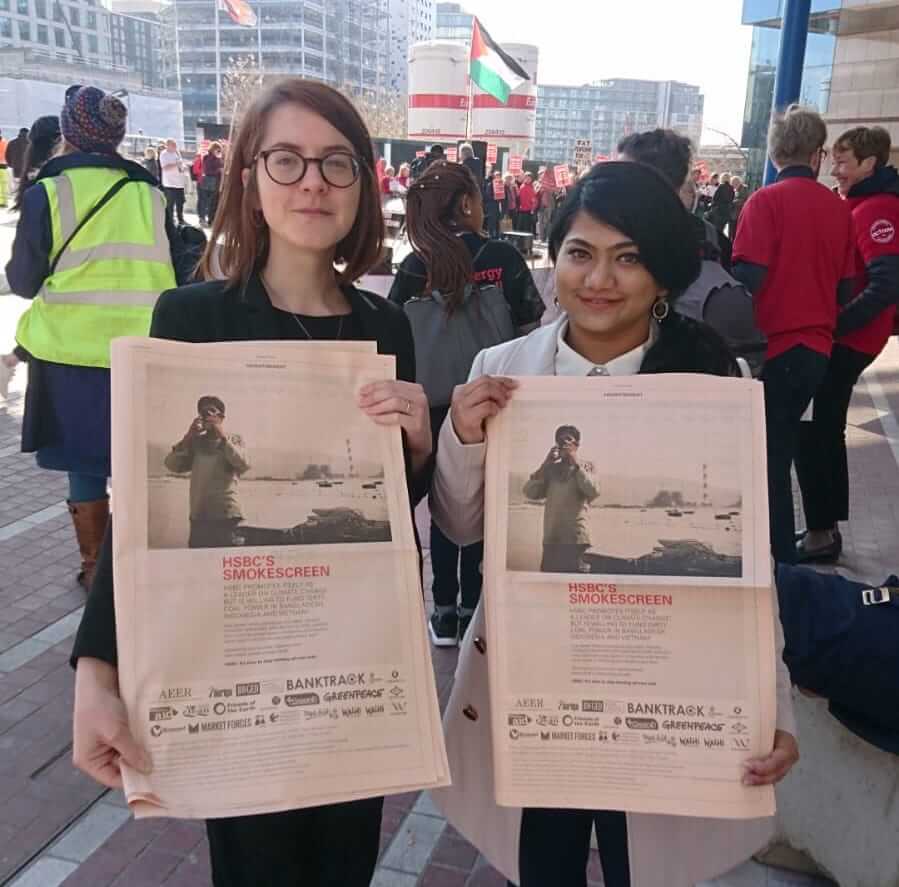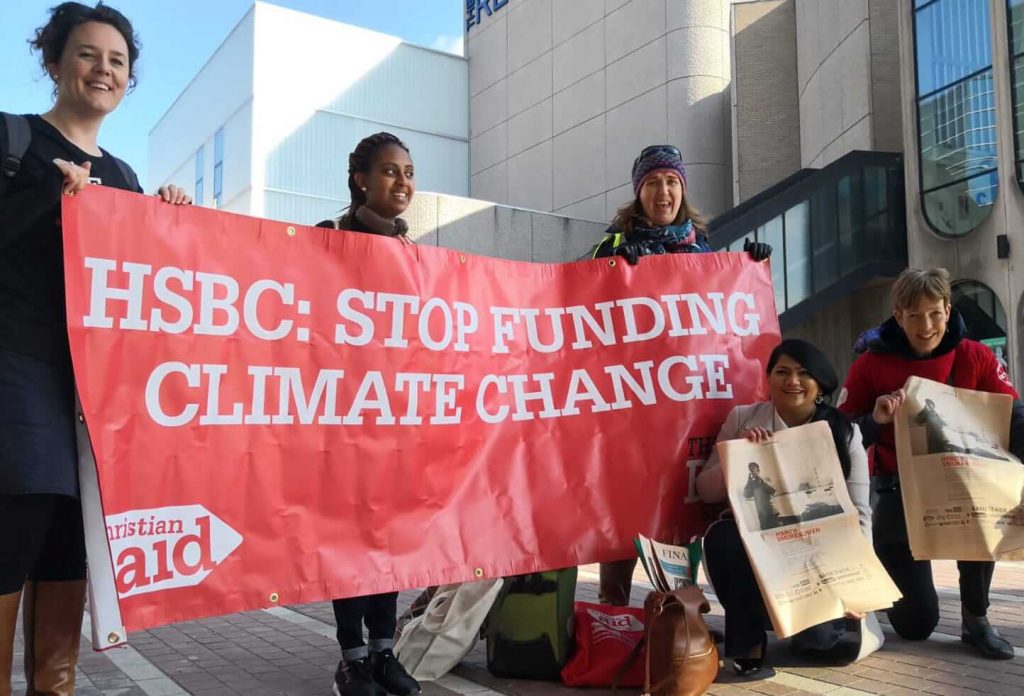
A full-page ad in the UK’s biggest business newspaper, a protest and plenty of deservedly tough questions. HSBC’s AGM had it all.
15 April 2019
Last Friday marked HSBC’s 2019 annual general meeting (AGM) and a year since the bank shamefully decided to leave the door open to funding new coal-fired power stations in Bangladesh, Indonesia and Vietnam. Market Forces joined others at the meeting in the UK to lament this policy and tell Europe’s biggest bank it must do better.
UPDATE (MAY 2020)
Take Action: Tell HSBC to stop supporting fossil fuel expansion
Before the AGM
The weeks and months preceding the meeting were filled with diverse voices telling the bank to end coal finance. Market Forces launched a popular email action, while ShareAction coordinated an open letter from investors with >$1 trillion under management or stewardship. SumOfUs hosted a petition, and of course Nguy Thi Hang of Vietnam’s Green Innovation and Development Centre (GreenID) wrote an honest and withering assessment of HSBC’s hypocritical energy policy for Asia Times, revealing an open letter to the bank from 13 organisations in Bangladesh, Indonesia and Vietnam.
The message couldn’t have been more clear.
AGM day
Except the message did become more clear… and louder. On the day of the AGM a full-page advertisement, coordinated by Market Forces, appeared in the influential Financial Times (FT), a newspaper read widely
On the concourse outside the meeting, groups with colourful signs, placards and banners chanted, calling out HSBC’s unfair and hypocritical funding of fossil fuels.

Tough questions
Inside the meeting, HSBC faced a barrage of deservedly tough questions from shareholders about its dirty finance for fossil fuels.
Market Forces Analyst and Bangladeshi citizen Munira raised HSBC’s financial backing for the planned Payra Port dredging project in Bangladesh, which will enable a huge increase in imported thermal coal if it goes ahead. The coal would supply at least eight new coal-fired power stations with combined lifetime CO2 emissions equivalent to three times the annual emissions of the UK. The resulting air pollution would also have disastrous impacts on local people’s health.
Asked whether HSBC planned to withdraw its support for the dredging, the bank’s CEO John Flint dodged the question entirely, telling shareholders he wasn’t aware of the project. And while he conceded that “coal is probably the first fossil fuel that does need to come out of the energy mix,” he argued that Bangladesh, Indonesia and Vietnam have limited access to electricity and no viable alternatives to coal.
Coal’s devastating health impact
John Flint’s coal-for-development argument however completely ignores coal’s enormous health costs for communities. For example, Harvard University researchers calculate that, in Indonesia and Vietnam alone, coal-fired power pollution could cause 43,620 excess deaths every year by 2030.
Aside from being an unacceptable burden given the ability of renewables to provide clean power to communities, the health costs of coal-fired power stations are virtually never paid by the companies building and operating them.
And it’s now very clear that clean energy is viable. Analysts at Carbon Tracker calculate that new renewables in Indonesia and Vietnam will be cheaper than new coal power in 2021 and 2020 (respectively). Both countries currently have viable renewable energy opportunities and are actively pursuing plans for renewables.
Researchers, including those at the University of California, Berkeley state that “Bangladesh could replace large portion of 13.3 GW of planned coal projects with utility-scale solar for an average LCOE of $91/MWh, compared to $110/MWh for coal, given the identified 53GW potential from solar PV.”
John Flint’s comment regarding these countries’ limited electricity access is simply absurd. In 2016 Indonesia and Vietnam had electrification rates of 97.6% and 100%, respectively.
John Flint’s comment regarding electricity access is simply absurd. In 2016 Indonesia and Vietnam had electrification rates of 97.6% and 100%, respectively. These rates are very high compared to those of Cambodia (50%) and Myanmar (57%), for example, where HSBC will no longer fund new coal power.
The CEO failed to acknowledge or address any of these points. Watch the full interaction here:
HSBC was also asked to commit to
One year on from releasing its smokescreen energy policy, HSBC clearly still has a serious coal problem. It simply cannot promote itself as a leader on climate change whilst keeping the door wide open to expanding the coal and wider fossil fuel industry. Developing communities deserve better.
